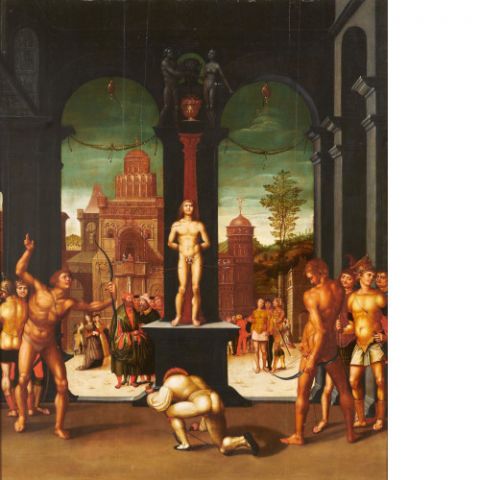
Lot was sold
Lot 1245 | Ducks in the Reeds
Estimate
8.000
- 10.000
€
D
Result:
(incl. premium)
11.220 €
KOESTER, ALEXANDER MAX
1864 Bergneustadt - 1932 Munich
Title: Ducks in the Reeds.
Technique: Oil on card.
Measurement: 20 x 31,5cm.
Notation: Signed lower right: A. Koester.
Frame/Pedestal: Framed.
Provenance:
Private ownership, Germany.
Individual strong, coarse brushstrokes run through the canvas of the German Late Impressionist Alexander Koester (lot 1245). At first glance, only green-bluish nuanced as well as white and yellow color applications are visible. However, upon closer inspection, the thick dabs come together to form a motif: The individually recurring yellow color spots represent beaks and the white color the plumage of a total of ten ducks at the water's edge. The lightly flaring blues and reds in the feathers reflect the iridescent play of light in the animals' plumage, which creates an incredible energy of movement. Duck motifs run through the career of the artist, who was born in 1864 in what is now Bergneustadt. Not only did they bring Alexander Koester his breakthrough and the recognition of Kaiser Wilhelm II, the duck subjects also gave him his artist name "Enten-Koester" by which he is still known today. After training as a pharmacist, Alexander Koester entered the Academy of Arts in Karlsruhe in 1885, where he initially devoted himself to genre painting. Only after graduating in 1896 and moving to Klausen in South Tyrol did he include nature in his artistic repertoire. There he specialized in painting landscapes and waterfowl, which he painted alone or in groups in a variety of situations and colors. For the artist, it was not only the ducks as living creatures that were of interest, but it was the way the glossy surface of their feathers combined with the sunspots falling on them to create a play of light. He knew how to translate the shining and glittering of the white feathers in a poetic manner through his painting style. The onset of World War I and Klausen's declaration as a war zone were also accompanied by drastic changes in Koester's life, yet this dramatic period found no place in the artist's oeuvre. Instead, the painter increasingly concentrated on floral still lifes (lot 1246). The bouquet of flowers before us is set against a grayish-bluish and slightly translucent curtain. In a green-glass vase there is a colorful flower arrangement consisting of uprising foxglove and other small yellow flowers. On the warm yellow wooden table lie the leaves of a wilted lily. Koester's disposition of colors is sensitively chosen, it reproduces with delicate effect the material elements depicted in the painting. The decorative painting style captivates the viewer's gaze, while at the same time radiating tranquility and relaxation.
1864 Bergneustadt - 1932 Munich
Title: Ducks in the Reeds.
Technique: Oil on card.
Measurement: 20 x 31,5cm.
Notation: Signed lower right: A. Koester.
Frame/Pedestal: Framed.
Provenance:
Private ownership, Germany.
Individual strong, coarse brushstrokes run through the canvas of the German Late Impressionist Alexander Koester (lot 1245). At first glance, only green-bluish nuanced as well as white and yellow color applications are visible. However, upon closer inspection, the thick dabs come together to form a motif: The individually recurring yellow color spots represent beaks and the white color the plumage of a total of ten ducks at the water's edge. The lightly flaring blues and reds in the feathers reflect the iridescent play of light in the animals' plumage, which creates an incredible energy of movement. Duck motifs run through the career of the artist, who was born in 1864 in what is now Bergneustadt. Not only did they bring Alexander Koester his breakthrough and the recognition of Kaiser Wilhelm II, the duck subjects also gave him his artist name "Enten-Koester" by which he is still known today. After training as a pharmacist, Alexander Koester entered the Academy of Arts in Karlsruhe in 1885, where he initially devoted himself to genre painting. Only after graduating in 1896 and moving to Klausen in South Tyrol did he include nature in his artistic repertoire. There he specialized in painting landscapes and waterfowl, which he painted alone or in groups in a variety of situations and colors. For the artist, it was not only the ducks as living creatures that were of interest, but it was the way the glossy surface of their feathers combined with the sunspots falling on them to create a play of light. He knew how to translate the shining and glittering of the white feathers in a poetic manner through his painting style. The onset of World War I and Klausen's declaration as a war zone were also accompanied by drastic changes in Koester's life, yet this dramatic period found no place in the artist's oeuvre. Instead, the painter increasingly concentrated on floral still lifes (lot 1246). The bouquet of flowers before us is set against a grayish-bluish and slightly translucent curtain. In a green-glass vase there is a colorful flower arrangement consisting of uprising foxglove and other small yellow flowers. On the warm yellow wooden table lie the leaves of a wilted lily. Koester's disposition of colors is sensitively chosen, it reproduces with delicate effect the material elements depicted in the painting. The decorative painting style captivates the viewer's gaze, while at the same time radiating tranquility and relaxation.
Contact:
Print this lot | Recommend lot |
Conditions of this Lot
VAT margin scheme, VAT included, but must not be indicated, not refundable
32% buyer’s premium on the hammer price
32% buyer’s premium on the hammer price
Estimated shipping costs for this lot:
Germany: 28,57 Euro plus 5,43 Euro VAT
EU: 50,42 Euro plus 9,58 Euro VAT
Worldwide: 79,83 Euro plus 15,17 Euro VAT
additional shipping insurance
Similar works in the auction
Alexander Max Koester Germany Post Impressionism 19th C. Paintings Animals Sketch Ducks
Alexander Max Koester Germany Post Impressionism 19th C. Paintings Animals Sketch Ducks
Stock Id: 70394-1



